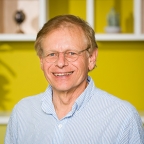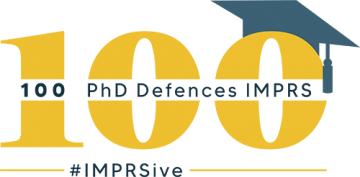The germ of an idea
An interview with founder Stephen C. Levinson
To celebrate the publication of 100 doctoral theses by the International Max Planck Research School (IMPRS) for Language Sciences, we interviewed Stephen C. Levinson, one of the MPI’s most renowned directors and founder of the IMPRS for Language Sciences.
How did the IMPRS get started?
I was managing director of the MPI in 2008, and the opportunity arose to improve our graduate training. At the time, the Max Planck Society was keen to develop closer ties with German universities. The Society thought that gaining international students would benefit all partners, so it offered funding to start IMPRSs. Our problem was that we were at some distance from German universities with language interests.
Despite the fact that the IMPRS framework was specifically limited to German universities, I got permission to ask our local Radboud University faculties to see if there was interest in a broad language sciences graduate school. I had always felt language was too important a subject to be squeezed within disciplinary boundaries—there is nothing in humanities that is not language based, and the place of language in cognition and brain is the key element in the success of our species. It turned out that the University was just beginning to think in terms of collective organised graduate schools, and that we were fortunately just ahead of developments. There was cross-faculty enthusiasm. I remember going to see the dean of the medical faculty, thinking this was a difficult sell, but not at all, he said “go ahead!” We rapidly acquired the help of Els den Os, herself a speech researcher already playing a role in the University administration; she knew everybody in a professional capacity and was able to steer our proposal through, so that the other Radboud graduate schools were formed taking our IMPRS into account. The ease with which we made the local arrangements with four faculties was striking. Els played a critical role in the early success of the project, helping to forge a proper curriculum and assessment system. The only thing Els and I never managed to achieve was to get Radboud to agree to a PhD diploma with mention of the IMPRS (we had to settle for an additional certificate)!
How was the MPI organised at the time?
Before IMPRS, our doctoral students were appointed by individual directors, and graduated in various universities in the Netherlands, Germany, the USA, and elsewhere. There was no unifying programme, and little support beyond the immediate supervision team. Don’t get me wrong: we had great students, but arrangements to improve their background skills had to be made ad hoc, and supervision could be haphazard. The Institute was also on the cusp of change, with two forthcoming director retirements, and my mission to get a genetics department yet to materialise. It was the right moment to get a proper graduate programme into place.
Are there any challenges or memorable moments that you would like to share?
Well, I remember feeling quite crushed when our approaches to German universities were rebuffed, and what a welcome relief it was to deal with the leadership of Radboud. The success of the IMPRS ultimately relies on the qualities of our supervisors—often themselves fresh out of graduate school—and the academic leadership across the faculties involved: everybody has been willing to put a lot of effort into making it work well. We’ve also been very fortunate to have excellent coordinators and assistants in Els den Os, Rachel Sheer, Dirkje van der Aa and Kevin Lam, marrying efficiency with an understanding ear.
How has doctoral training changed over the years?
I was lucky enough to do a PhD in the USA, where a proper graduate training complements the much broader first degrees. But when I was a Cambridge don, we just let the doctoral students sink or swim! Students in Europe, especially in the social sciences and the humanities, generally had greater freedom, but no access to the specialist training that they often needed (lab-based sciences always had better training, if only to prevent the students from destroying the equipment!). The idea of working in collaborative teams did not extend throughout the humanities or much of the social sciences (PhD students often had to sign “this is my sole, unaided work”). As a whole, I suspect that graduate training in Europe still tends to lag behind the USA, but the increasing smorgasbord of graduate schools, summer schools and methods training is a huge step forward.
What does it take to be a good scientist, and has that changed?
Some things never change: it takes ‘application, application, application’ to be a good scientist. Good ideas come from a deep study of the intellectual landscape, that’s how you come to see a path no-one has taken. Things that have changed perhaps are the global needs to (a) present your work eloquently to a broad audience, (b) efficiently manage your time, grants, students and career, (c) use the latest hi-tech tools, (d) have the self-confidence to challenge old ideas and launch new ones under barrage from social media, and (e) keep up with a burgeoning literature. Perhaps like all walks of life we have increasingly professionalised. I only worry that the all-round skills now required may mean that we are losing the real innovators, who are often shy oddballs.
What are the challenges for future language scientists?
The thing that makes the language sciences difficult is the strange ontology of language: partly cultural, partly biological, partly internal, partly external. It’s a bio-cultural hybrid, a conspiracy between different planes of reality which makes it tough to grasp in its entirety. On a phylogenetic timescale it is a very recent innovation—for that reason I think real progress is likely to come from an evolutionary perspective rather than a purely functional one. The challenge here is to understand enough of the different contributory disciplines to be able to fuse a new approach. The IMPRS was set up to aid and abet these developments, but interdisciplinary work remains very challenging: it cannot just be done by collaboration, it needs more than one discipline in the self-same head: we have to reach over our own discipline’s boundaries. Meanwhile, many sciences are becoming ever more specialised, and the nineteenth century disciplines still structure careers. The challenge for the IMPRS is to show that interdisciplinary work pays off. And I think it has shown that: with 100 graduates, many of whom have gone into academia and are making vital contributions to science, I think we have much to be proud of.
[ back to top ]


Share this page